Analysis of IFRS Adoption Impact on International Financial Management
VerifiedAdded on 2023/04/24
|10
|1745
|224
Report
AI Summary
This report analyzes the article "International Financial Reporting Standards adoption and information quality: Evidence from Brazil" by Eng, Lin, and De Figueiredo. The study examines the impact of mandatory IFRS adoption in Brazil on accounting and financial information, focusing on value relevance, earnings information, and financial analyst activities. The research compares the periods before and after the adoption of IFRS to assess its effects. The report identifies the key concepts of international financial management, such as the establishment of a common accounting language, and discusses the implications of IFRS adoption on financial management, including the increased relevance of earnings and book value, information content, financial analyst coverage, and liquidity. The report concludes that while the mandatory adoption of IFRS has brought partial support to the accounting and financial information of Brazil, maintaining compliance with IFRS standards will increase the value relevance of accounting and financial information.
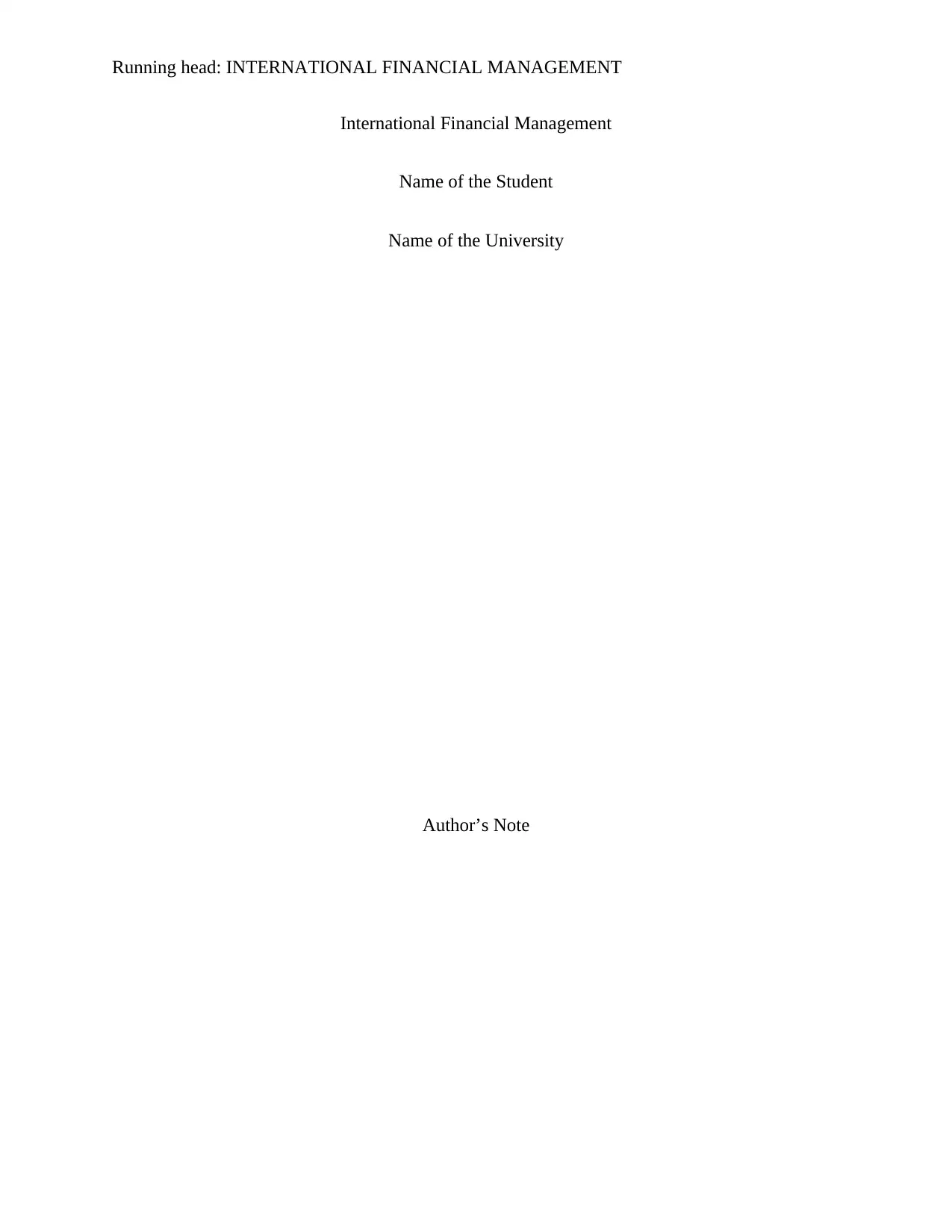
Running head: INTERNATIONAL FINANCIAL MANAGEMENT
International Financial Management
Name of the Student
Name of the University
Author’s Note
International Financial Management
Name of the Student
Name of the University
Author’s Note
Paraphrase This Document
Need a fresh take? Get an instant paraphrase of this document with our AI Paraphraser
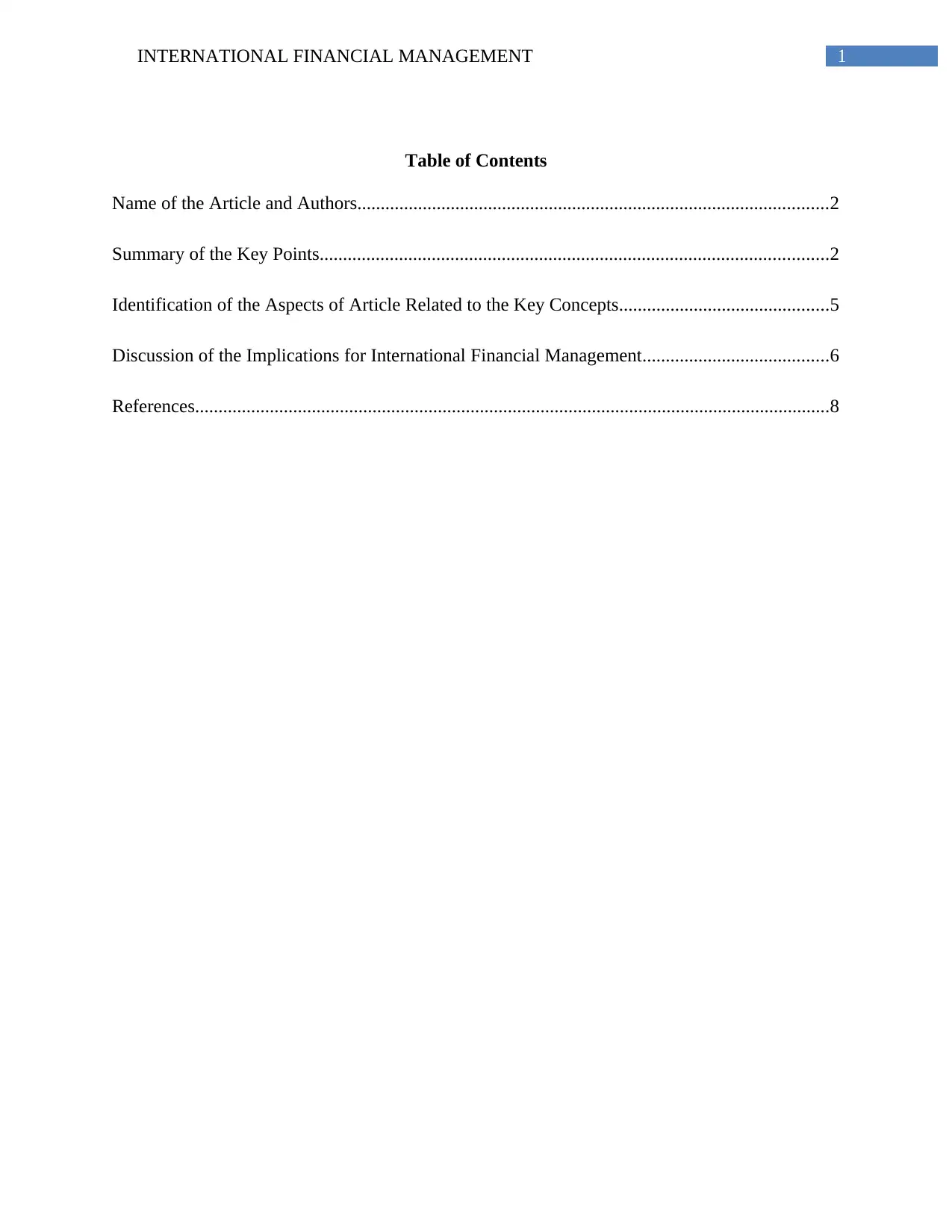
1INTERNATIONAL FINANCIAL MANAGEMENT
Table of Contents
Name of the Article and Authors.....................................................................................................2
Summary of the Key Points.............................................................................................................2
Identification of the Aspects of Article Related to the Key Concepts.............................................5
Discussion of the Implications for International Financial Management........................................6
References........................................................................................................................................8
Table of Contents
Name of the Article and Authors.....................................................................................................2
Summary of the Key Points.............................................................................................................2
Identification of the Aspects of Article Related to the Key Concepts.............................................5
Discussion of the Implications for International Financial Management........................................6
References........................................................................................................................................8
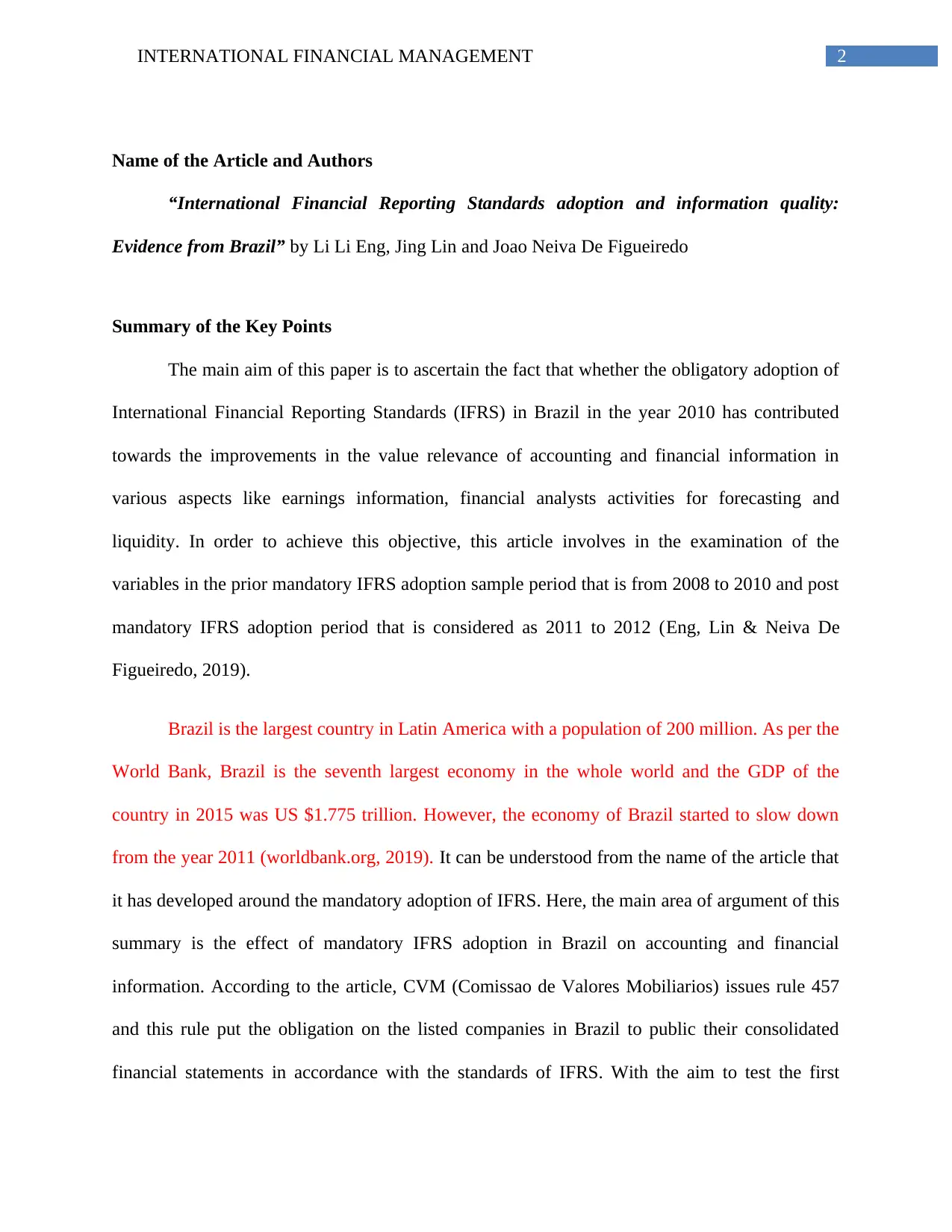
2INTERNATIONAL FINANCIAL MANAGEMENT
Name of the Article and Authors
“International Financial Reporting Standards adoption and information quality:
Evidence from Brazil” by Li Li Eng, Jing Lin and Joao Neiva De Figueiredo
Summary of the Key Points
The main aim of this paper is to ascertain the fact that whether the obligatory adoption of
International Financial Reporting Standards (IFRS) in Brazil in the year 2010 has contributed
towards the improvements in the value relevance of accounting and financial information in
various aspects like earnings information, financial analysts activities for forecasting and
liquidity. In order to achieve this objective, this article involves in the examination of the
variables in the prior mandatory IFRS adoption sample period that is from 2008 to 2010 and post
mandatory IFRS adoption period that is considered as 2011 to 2012 (Eng, Lin & Neiva De
Figueiredo, 2019).
Brazil is the largest country in Latin America with a population of 200 million. As per the
World Bank, Brazil is the seventh largest economy in the whole world and the GDP of the
country in 2015 was US $1.775 trillion. However, the economy of Brazil started to slow down
from the year 2011 (worldbank.org, 2019). It can be understood from the name of the article that
it has developed around the mandatory adoption of IFRS. Here, the main area of argument of this
summary is the effect of mandatory IFRS adoption in Brazil on accounting and financial
information. According to the article, CVM (Comissao de Valores Mobiliarios) issues rule 457
and this rule put the obligation on the listed companies in Brazil to public their consolidated
financial statements in accordance with the standards of IFRS. With the aim to test the first
Name of the Article and Authors
“International Financial Reporting Standards adoption and information quality:
Evidence from Brazil” by Li Li Eng, Jing Lin and Joao Neiva De Figueiredo
Summary of the Key Points
The main aim of this paper is to ascertain the fact that whether the obligatory adoption of
International Financial Reporting Standards (IFRS) in Brazil in the year 2010 has contributed
towards the improvements in the value relevance of accounting and financial information in
various aspects like earnings information, financial analysts activities for forecasting and
liquidity. In order to achieve this objective, this article involves in the examination of the
variables in the prior mandatory IFRS adoption sample period that is from 2008 to 2010 and post
mandatory IFRS adoption period that is considered as 2011 to 2012 (Eng, Lin & Neiva De
Figueiredo, 2019).
Brazil is the largest country in Latin America with a population of 200 million. As per the
World Bank, Brazil is the seventh largest economy in the whole world and the GDP of the
country in 2015 was US $1.775 trillion. However, the economy of Brazil started to slow down
from the year 2011 (worldbank.org, 2019). It can be understood from the name of the article that
it has developed around the mandatory adoption of IFRS. Here, the main area of argument of this
summary is the effect of mandatory IFRS adoption in Brazil on accounting and financial
information. According to the article, CVM (Comissao de Valores Mobiliarios) issues rule 457
and this rule put the obligation on the listed companies in Brazil to public their consolidated
financial statements in accordance with the standards of IFRS. With the aim to test the first
⊘ This is a preview!⊘
Do you want full access?
Subscribe today to unlock all pages.

Trusted by 1+ million students worldwide
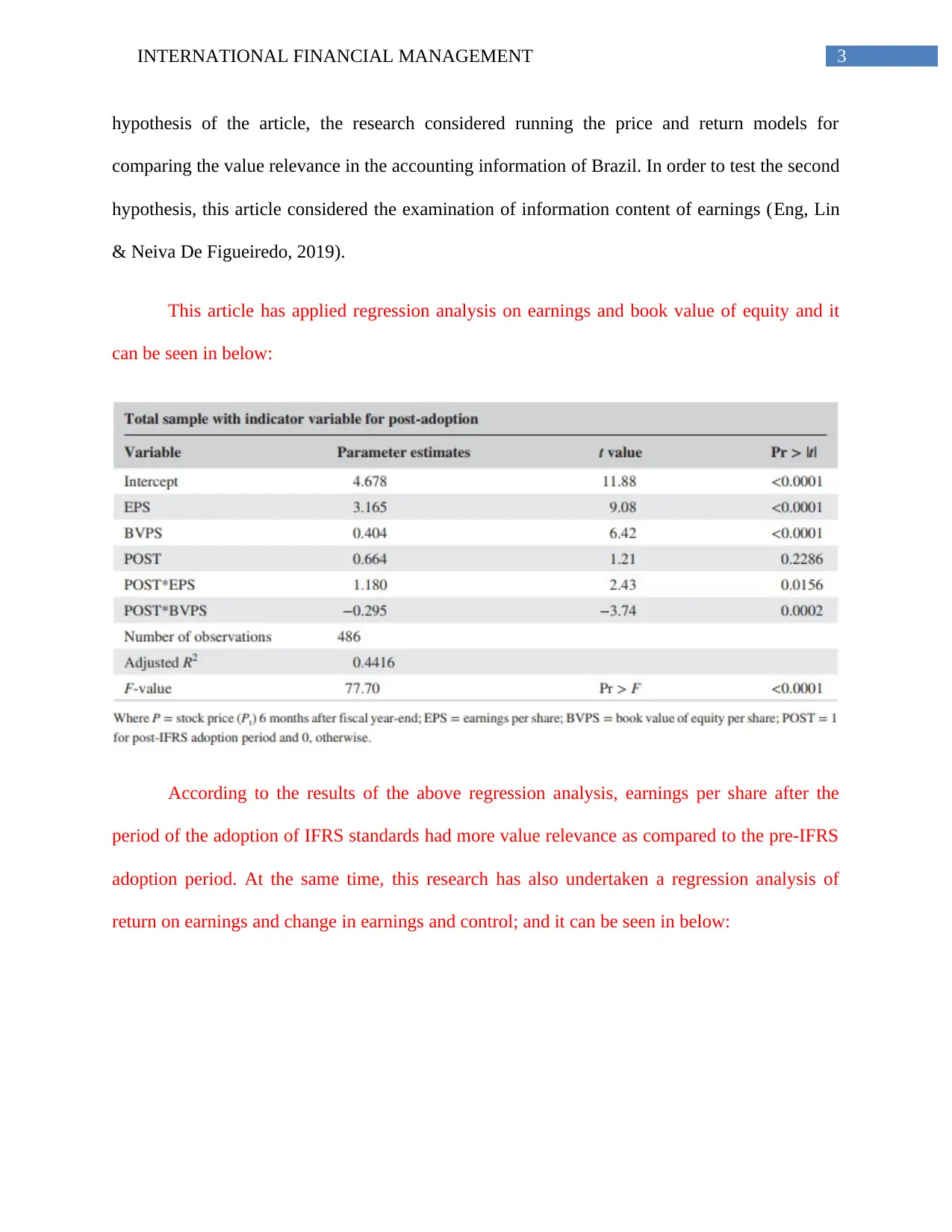
3INTERNATIONAL FINANCIAL MANAGEMENT
hypothesis of the article, the research considered running the price and return models for
comparing the value relevance in the accounting information of Brazil. In order to test the second
hypothesis, this article considered the examination of information content of earnings (Eng, Lin
& Neiva De Figueiredo, 2019).
This article has applied regression analysis on earnings and book value of equity and it
can be seen in below:
According to the results of the above regression analysis, earnings per share after the
period of the adoption of IFRS standards had more value relevance as compared to the pre-IFRS
adoption period. At the same time, this research has also undertaken a regression analysis of
return on earnings and change in earnings and control; and it can be seen in below:
hypothesis of the article, the research considered running the price and return models for
comparing the value relevance in the accounting information of Brazil. In order to test the second
hypothesis, this article considered the examination of information content of earnings (Eng, Lin
& Neiva De Figueiredo, 2019).
This article has applied regression analysis on earnings and book value of equity and it
can be seen in below:
According to the results of the above regression analysis, earnings per share after the
period of the adoption of IFRS standards had more value relevance as compared to the pre-IFRS
adoption period. At the same time, this research has also undertaken a regression analysis of
return on earnings and change in earnings and control; and it can be seen in below:
Paraphrase This Document
Need a fresh take? Get an instant paraphrase of this document with our AI Paraphraser
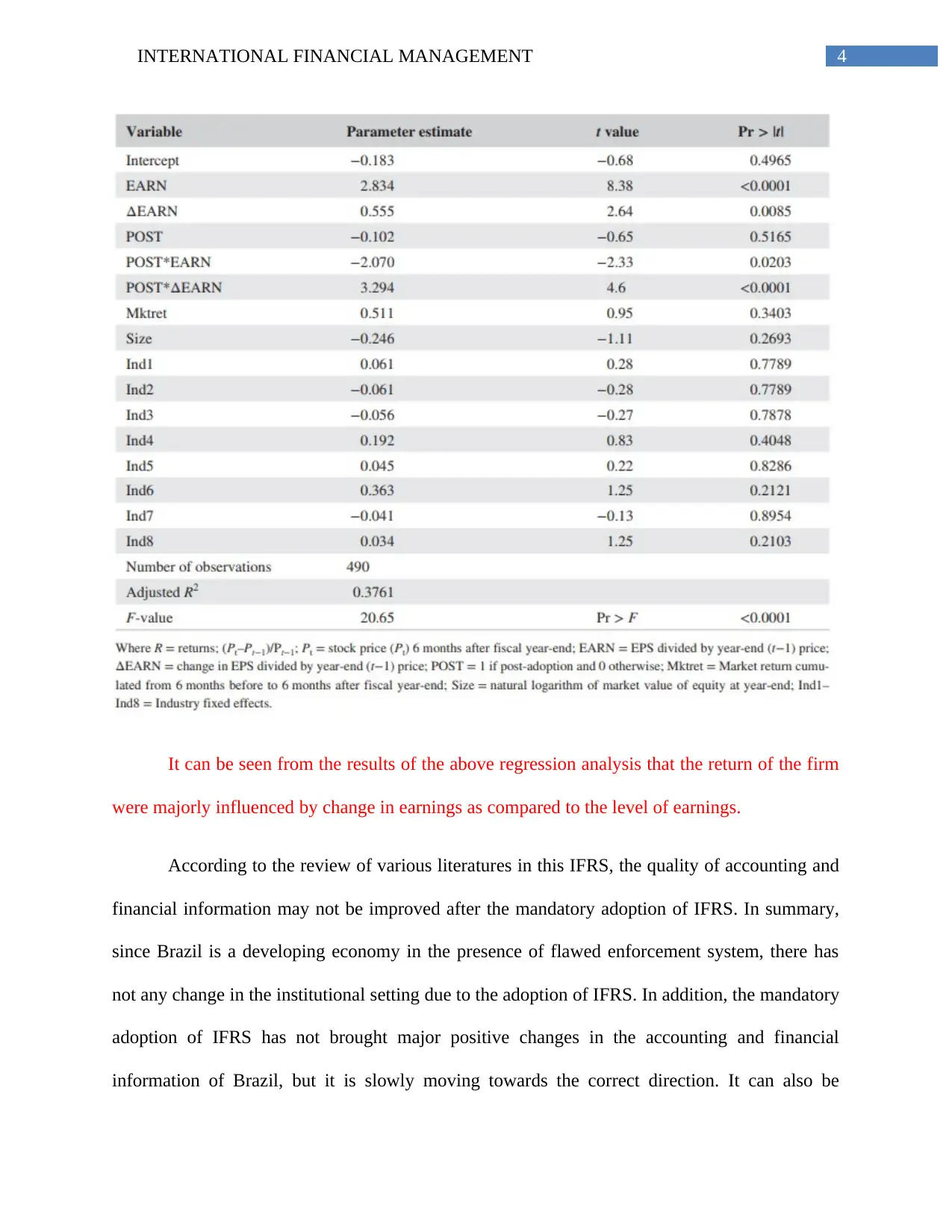
4INTERNATIONAL FINANCIAL MANAGEMENT
It can be seen from the results of the above regression analysis that the return of the firm
were majorly influenced by change in earnings as compared to the level of earnings.
According to the review of various literatures in this IFRS, the quality of accounting and
financial information may not be improved after the mandatory adoption of IFRS. In summary,
since Brazil is a developing economy in the presence of flawed enforcement system, there has
not any change in the institutional setting due to the adoption of IFRS. In addition, the mandatory
adoption of IFRS has not brought major positive changes in the accounting and financial
information of Brazil, but it is slowly moving towards the correct direction. It can also be
It can be seen from the results of the above regression analysis that the return of the firm
were majorly influenced by change in earnings as compared to the level of earnings.
According to the review of various literatures in this IFRS, the quality of accounting and
financial information may not be improved after the mandatory adoption of IFRS. In summary,
since Brazil is a developing economy in the presence of flawed enforcement system, there has
not any change in the institutional setting due to the adoption of IFRS. In addition, the mandatory
adoption of IFRS has not brought major positive changes in the accounting and financial
information of Brazil, but it is slowly moving towards the correct direction. It can also be
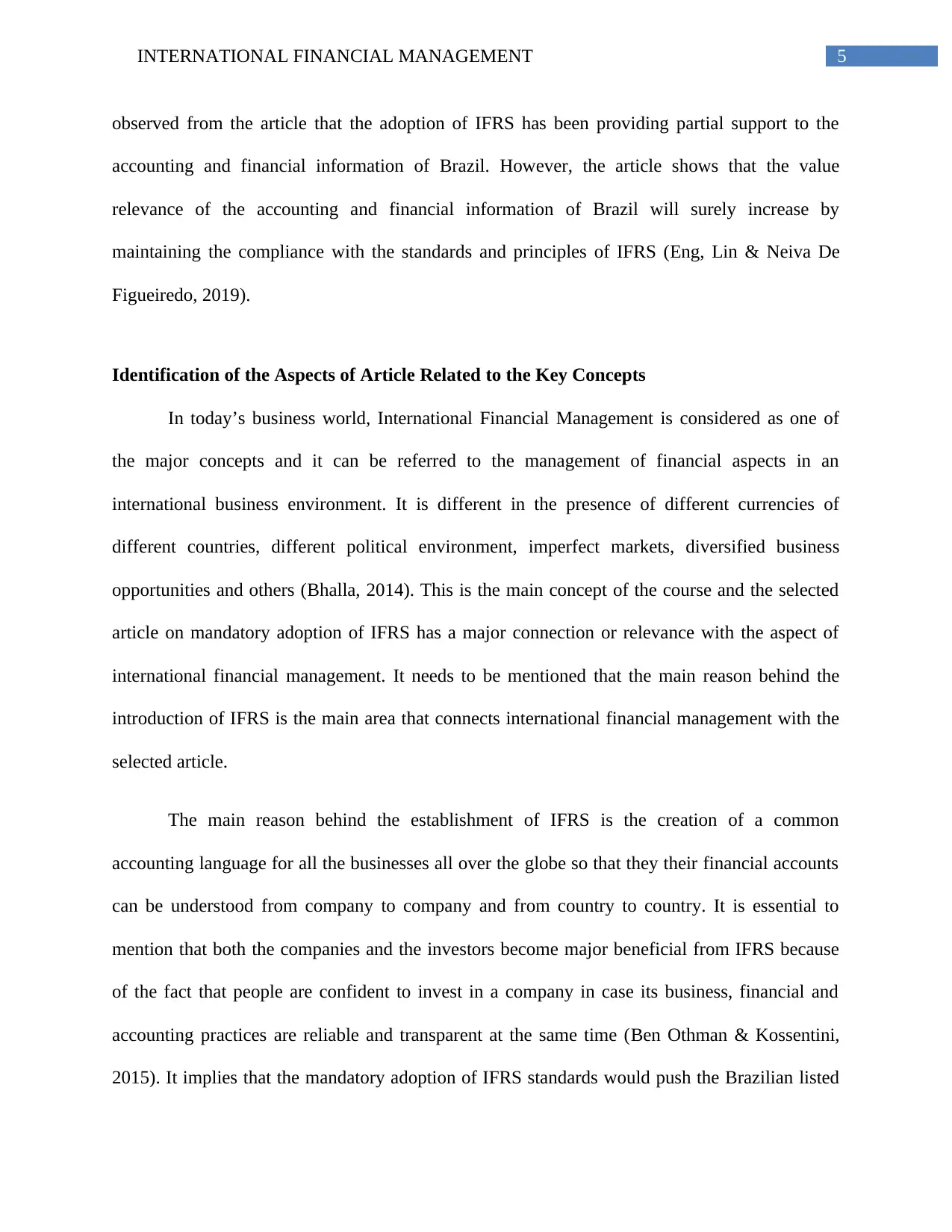
5INTERNATIONAL FINANCIAL MANAGEMENT
observed from the article that the adoption of IFRS has been providing partial support to the
accounting and financial information of Brazil. However, the article shows that the value
relevance of the accounting and financial information of Brazil will surely increase by
maintaining the compliance with the standards and principles of IFRS (Eng, Lin & Neiva De
Figueiredo, 2019).
Identification of the Aspects of Article Related to the Key Concepts
In today’s business world, International Financial Management is considered as one of
the major concepts and it can be referred to the management of financial aspects in an
international business environment. It is different in the presence of different currencies of
different countries, different political environment, imperfect markets, diversified business
opportunities and others (Bhalla, 2014). This is the main concept of the course and the selected
article on mandatory adoption of IFRS has a major connection or relevance with the aspect of
international financial management. It needs to be mentioned that the main reason behind the
introduction of IFRS is the main area that connects international financial management with the
selected article.
The main reason behind the establishment of IFRS is the creation of a common
accounting language for all the businesses all over the globe so that they their financial accounts
can be understood from company to company and from country to country. It is essential to
mention that both the companies and the investors become major beneficial from IFRS because
of the fact that people are confident to invest in a company in case its business, financial and
accounting practices are reliable and transparent at the same time (Ben Othman & Kossentini,
2015). It implies that the mandatory adoption of IFRS standards would push the Brazilian listed
observed from the article that the adoption of IFRS has been providing partial support to the
accounting and financial information of Brazil. However, the article shows that the value
relevance of the accounting and financial information of Brazil will surely increase by
maintaining the compliance with the standards and principles of IFRS (Eng, Lin & Neiva De
Figueiredo, 2019).
Identification of the Aspects of Article Related to the Key Concepts
In today’s business world, International Financial Management is considered as one of
the major concepts and it can be referred to the management of financial aspects in an
international business environment. It is different in the presence of different currencies of
different countries, different political environment, imperfect markets, diversified business
opportunities and others (Bhalla, 2014). This is the main concept of the course and the selected
article on mandatory adoption of IFRS has a major connection or relevance with the aspect of
international financial management. It needs to be mentioned that the main reason behind the
introduction of IFRS is the main area that connects international financial management with the
selected article.
The main reason behind the establishment of IFRS is the creation of a common
accounting language for all the businesses all over the globe so that they their financial accounts
can be understood from company to company and from country to country. It is essential to
mention that both the companies and the investors become major beneficial from IFRS because
of the fact that people are confident to invest in a company in case its business, financial and
accounting practices are reliable and transparent at the same time (Ben Othman & Kossentini,
2015). It implies that the mandatory adoption of IFRS standards would push the Brazilian listed
⊘ This is a preview!⊘
Do you want full access?
Subscribe today to unlock all pages.

Trusted by 1+ million students worldwide
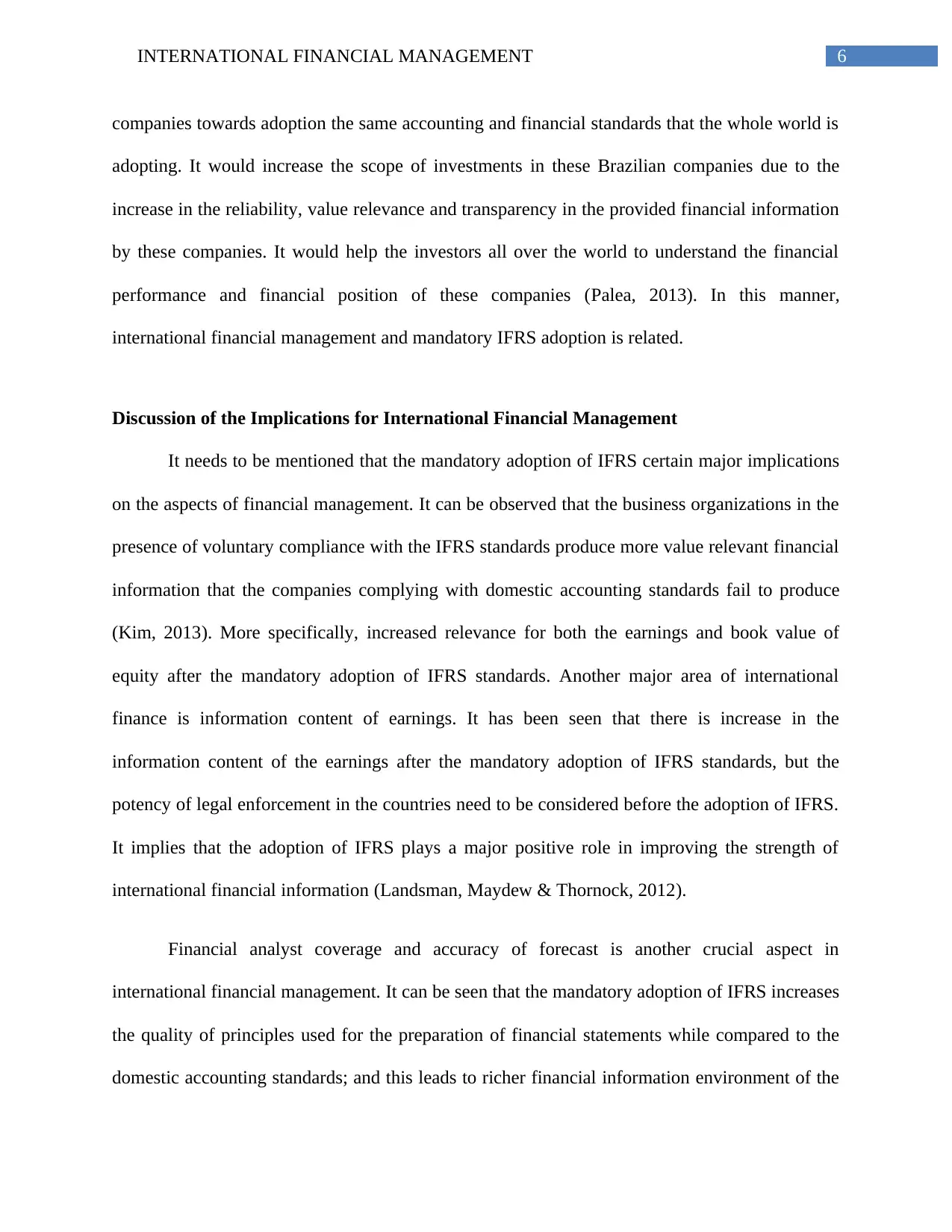
6INTERNATIONAL FINANCIAL MANAGEMENT
companies towards adoption the same accounting and financial standards that the whole world is
adopting. It would increase the scope of investments in these Brazilian companies due to the
increase in the reliability, value relevance and transparency in the provided financial information
by these companies. It would help the investors all over the world to understand the financial
performance and financial position of these companies (Palea, 2013). In this manner,
international financial management and mandatory IFRS adoption is related.
Discussion of the Implications for International Financial Management
It needs to be mentioned that the mandatory adoption of IFRS certain major implications
on the aspects of financial management. It can be observed that the business organizations in the
presence of voluntary compliance with the IFRS standards produce more value relevant financial
information that the companies complying with domestic accounting standards fail to produce
(Kim, 2013). More specifically, increased relevance for both the earnings and book value of
equity after the mandatory adoption of IFRS standards. Another major area of international
finance is information content of earnings. It has been seen that there is increase in the
information content of the earnings after the mandatory adoption of IFRS standards, but the
potency of legal enforcement in the countries need to be considered before the adoption of IFRS.
It implies that the adoption of IFRS plays a major positive role in improving the strength of
international financial information (Landsman, Maydew & Thornock, 2012).
Financial analyst coverage and accuracy of forecast is another crucial aspect in
international financial management. It can be seen that the mandatory adoption of IFRS increases
the quality of principles used for the preparation of financial statements while compared to the
domestic accounting standards; and this leads to richer financial information environment of the
companies towards adoption the same accounting and financial standards that the whole world is
adopting. It would increase the scope of investments in these Brazilian companies due to the
increase in the reliability, value relevance and transparency in the provided financial information
by these companies. It would help the investors all over the world to understand the financial
performance and financial position of these companies (Palea, 2013). In this manner,
international financial management and mandatory IFRS adoption is related.
Discussion of the Implications for International Financial Management
It needs to be mentioned that the mandatory adoption of IFRS certain major implications
on the aspects of financial management. It can be observed that the business organizations in the
presence of voluntary compliance with the IFRS standards produce more value relevant financial
information that the companies complying with domestic accounting standards fail to produce
(Kim, 2013). More specifically, increased relevance for both the earnings and book value of
equity after the mandatory adoption of IFRS standards. Another major area of international
finance is information content of earnings. It has been seen that there is increase in the
information content of the earnings after the mandatory adoption of IFRS standards, but the
potency of legal enforcement in the countries need to be considered before the adoption of IFRS.
It implies that the adoption of IFRS plays a major positive role in improving the strength of
international financial information (Landsman, Maydew & Thornock, 2012).
Financial analyst coverage and accuracy of forecast is another crucial aspect in
international financial management. It can be seen that the mandatory adoption of IFRS increases
the quality of principles used for the preparation of financial statements while compared to the
domestic accounting standards; and this leads to richer financial information environment of the
Paraphrase This Document
Need a fresh take? Get an instant paraphrase of this document with our AI Paraphraser
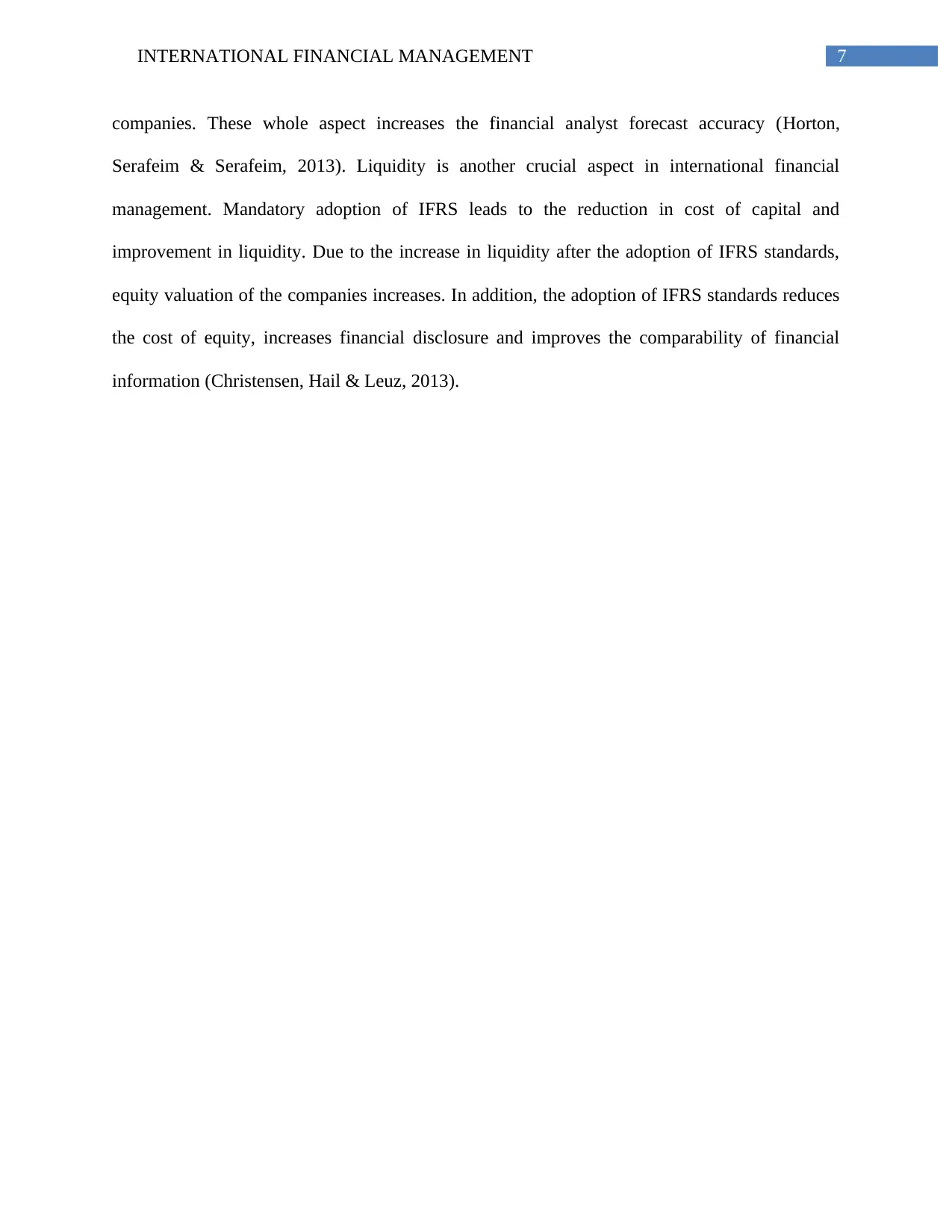
7INTERNATIONAL FINANCIAL MANAGEMENT
companies. These whole aspect increases the financial analyst forecast accuracy (Horton,
Serafeim & Serafeim, 2013). Liquidity is another crucial aspect in international financial
management. Mandatory adoption of IFRS leads to the reduction in cost of capital and
improvement in liquidity. Due to the increase in liquidity after the adoption of IFRS standards,
equity valuation of the companies increases. In addition, the adoption of IFRS standards reduces
the cost of equity, increases financial disclosure and improves the comparability of financial
information (Christensen, Hail & Leuz, 2013).
companies. These whole aspect increases the financial analyst forecast accuracy (Horton,
Serafeim & Serafeim, 2013). Liquidity is another crucial aspect in international financial
management. Mandatory adoption of IFRS leads to the reduction in cost of capital and
improvement in liquidity. Due to the increase in liquidity after the adoption of IFRS standards,
equity valuation of the companies increases. In addition, the adoption of IFRS standards reduces
the cost of equity, increases financial disclosure and improves the comparability of financial
information (Christensen, Hail & Leuz, 2013).
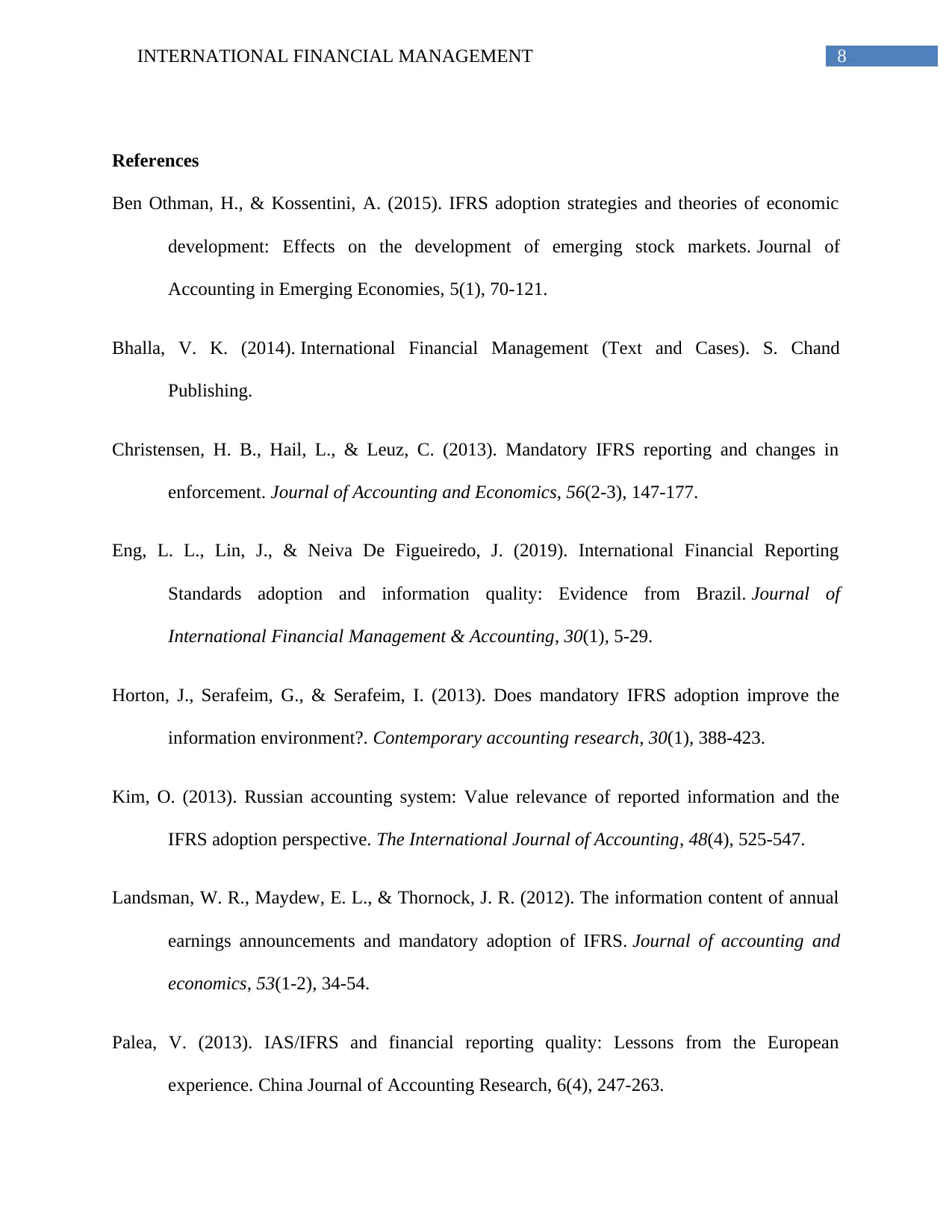
8INTERNATIONAL FINANCIAL MANAGEMENT
References
Ben Othman, H., & Kossentini, A. (2015). IFRS adoption strategies and theories of economic
development: Effects on the development of emerging stock markets. Journal of
Accounting in Emerging Economies, 5(1), 70-121.
Bhalla, V. K. (2014). International Financial Management (Text and Cases). S. Chand
Publishing.
Christensen, H. B., Hail, L., & Leuz, C. (2013). Mandatory IFRS reporting and changes in
enforcement. Journal of Accounting and Economics, 56(2-3), 147-177.
Eng, L. L., Lin, J., & Neiva De Figueiredo, J. (2019). International Financial Reporting
Standards adoption and information quality: Evidence from Brazil. Journal of
International Financial Management & Accounting, 30(1), 5-29.
Horton, J., Serafeim, G., & Serafeim, I. (2013). Does mandatory IFRS adoption improve the
information environment?. Contemporary accounting research, 30(1), 388-423.
Kim, O. (2013). Russian accounting system: Value relevance of reported information and the
IFRS adoption perspective. The International Journal of Accounting, 48(4), 525-547.
Landsman, W. R., Maydew, E. L., & Thornock, J. R. (2012). The information content of annual
earnings announcements and mandatory adoption of IFRS. Journal of accounting and
economics, 53(1-2), 34-54.
Palea, V. (2013). IAS/IFRS and financial reporting quality: Lessons from the European
experience. China Journal of Accounting Research, 6(4), 247-263.
References
Ben Othman, H., & Kossentini, A. (2015). IFRS adoption strategies and theories of economic
development: Effects on the development of emerging stock markets. Journal of
Accounting in Emerging Economies, 5(1), 70-121.
Bhalla, V. K. (2014). International Financial Management (Text and Cases). S. Chand
Publishing.
Christensen, H. B., Hail, L., & Leuz, C. (2013). Mandatory IFRS reporting and changes in
enforcement. Journal of Accounting and Economics, 56(2-3), 147-177.
Eng, L. L., Lin, J., & Neiva De Figueiredo, J. (2019). International Financial Reporting
Standards adoption and information quality: Evidence from Brazil. Journal of
International Financial Management & Accounting, 30(1), 5-29.
Horton, J., Serafeim, G., & Serafeim, I. (2013). Does mandatory IFRS adoption improve the
information environment?. Contemporary accounting research, 30(1), 388-423.
Kim, O. (2013). Russian accounting system: Value relevance of reported information and the
IFRS adoption perspective. The International Journal of Accounting, 48(4), 525-547.
Landsman, W. R., Maydew, E. L., & Thornock, J. R. (2012). The information content of annual
earnings announcements and mandatory adoption of IFRS. Journal of accounting and
economics, 53(1-2), 34-54.
Palea, V. (2013). IAS/IFRS and financial reporting quality: Lessons from the European
experience. China Journal of Accounting Research, 6(4), 247-263.
⊘ This is a preview!⊘
Do you want full access?
Subscribe today to unlock all pages.

Trusted by 1+ million students worldwide

9INTERNATIONAL FINANCIAL MANAGEMENT
Overview. (2019). World Bank. Retrieved 14 March 2019, from
http://www.worldbank.org/en/country/braz
Overview. (2019). World Bank. Retrieved 14 March 2019, from
http://www.worldbank.org/en/country/braz
1 out of 10
Related Documents
Your All-in-One AI-Powered Toolkit for Academic Success.
+13062052269
info@desklib.com
Available 24*7 on WhatsApp / Email
![[object Object]](/_next/static/media/star-bottom.7253800d.svg)
Unlock your academic potential
Copyright © 2020–2026 A2Z Services. All Rights Reserved. Developed and managed by ZUCOL.




